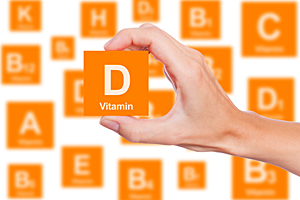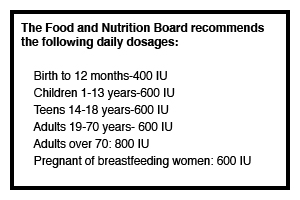
I recently read that an estimated 85 percent of the people in the United States are Vitamin D deficient. I never knew that Vitamin D, which many call the “Sunshine Vitamin,” influences more than 10 percent of our genes. According to Mercola.com there are more than 40,000 medical papers on Vitamin D. This veritable mountain of research indicates that Vitamin D has far-reaching benefits to our physical and mental health. With proper amounts, many health issues could be prevented or symptoms alleviated. According to a number of studies, an estimated 1 billion people in the world have inadequate Vitamin D supplies in their bodies. Wow!
Here are some examples of health issues that indicate a possible Vitamin D deficiency:

Despite being one of the most affluent countries in the world, many Americans are Vitamin D deficient.
- Depression
- Rheumatoid Arthritis
- Inflammatory bowel disease and other intestinal issues
- Cardiovascular
- Muscle weakness
- High blood pressure
- High cholesterol
Vitamin D is nutrient, found in a few specific foods, that is needed in order to maintain strong bones, by helping the body absorb calcium. Vitamin D is found in cells throughout the body. Studies have shown that people with higher levels of Vitamin D have a lower risk of disease. Vitamin D offers tremendous protective effects against a variety of different cancers, including pancreatic, lung, ovarian, breast, prostate, and skin cancers, according to Dr. Joseph Mercola, a world-renowned physician and New York Times bestselling author.

Winter months especially in the northern latitudes makes getting an adequate amount of vitamin D very challenging.
In Colorado, we usually get approximately 320 days of sunshine annually. However, I can honestly say it’s been cloudier than usual this winter. Many of us are experiencing cold and cloudy days. Let’s face it, when it’s cold and dreary outside we miss out on the benefits of Vitamin D.
In the United States, only people who live south of a line drawn from Los Angeles, California to Columbia, South Carolina receive enough sunlight for Vitamin D production throughout the year. Dark skin absorbs less sunlight, so people with dark skin don’t receive as much Vitamin D from sun exposure than do light-skinned people. This is particularly a problem for African-Americans in the northern US.
What impacts levels of Vitamin D?
- Pollution and cloudy days
- Sunscreen
- Spending more time indoors
- Working long hours indoors
- Living in cities where buildings block sunlight
The benefits of being mindful about keeping our Vitamin D levels within normal ranges include:
- The incidence of breast cancer could be reduced by 50 percent and colon cancer by 80 percent. (American Journal of Public Health)
- Lower risk of type I diabetes in children if taken in the first year of life
- Lower Diabetes risk (both types) in adults
- Lower risk of hip fractures and osteoporosis in 50 percent of women
- Lower risk of dementia in older adults, including reducing the risk of Alzheimer’s disease by 50 percent
- Promotion of cardiovascular health
- Promotion of healthy blood pressure and high cholesterol levels
- Promotion of reproductive system health
- Promotion of strong and healthy bones (you have to have enough Vitamin D to absorb any calcium you are getting or it doesn’t make a difference how much calcium you are getting)
- Promotion of weight management and fat metabolism
- Promotion of neurological health
- Reduction of fibromyalgia pain and progression of multiple sclerosis (Vitamin D may even play a role in reducing the risk of getting multiple sclerosis according to Dr. Mercola.)
The National Institute of Health (NIH) highly recommends getting your daily Vitamin D in any combination of these 3 ways:
- At least 10 minutes a day of mid-day direct sun exposure on the skin (through a window doesn’t work)
- Food
- Supplements
What Foods Should I eat to increase my Vitamin D levels?
- Fatty fish: salmon, tuna, sardines and mackerel are best
- Egg yolks, cheese and beef liver provide small amounts
- Mushrooms
- Shrimp
- Milk (fortified)
- Orange Juice (fortified)
- Cereal (fortified)
- Yogurt (fortified)
Can too much Vitamin D be toxic? Yes!

Webster’s defines IU as: a quantity of a biologic (such as a vitamin) that produces a particular biological effect agreed upon as an international standard.
While the body naturally limits the amount of Vitamin D received with sun exposure, toxicity can take place with an overuse of supplements. These signs include:
- Nausea
- Poor appetite and weight loss
- Constipation and weakness
In addition, an excess of Vitamin D can cause:
- Confusion
- Heart rhythm issues
- Kidney damage
Webster’s defines IU as: a quantity of a biologic (such as a vitamin) that produces a particular biological effect agreed upon as an international standard.
Certainly people over the age of 50 generally need higher amounts. I always recommend seeing your doctor once a year for a good physical and to get some blood work analyzed. It gives us all a good opportunity to discuss our Vitamin D levels and other medication issues with our physician.
When I was diagnosed with breast cancer 11 years ago, I remember reading that my Vitamin D level was very low. (I was living in Massachusetts at the time) While I don’t believe there was any one cause of my cancer diagnosis, I do believe that there was a combination of factors. Had I been aware of the protective qualities of Vitamin D, I would have been making better choices about getting more Vitamin D so that my overall health would have been better.
I’m grateful to have this information now so that I can work towards optimal health, as I grow older. I invite you all to make sure you’re getting enough of this wonderful “Sunshine Vitamin!”
Peace and Good Health!
Sources:
Life Extension Report-August 2013
“The Overlooked Importance of Vitamin D Receptors”
Mercola.Com-“The World’s Single Deadliest Vitamin Deficiency”
Healthline-“The Benefits of Vitamin D”
National Institutes of Health-Vitamin D Factsheet
Everyday Health-“5 Illnesses Linked to Vitamin D Deficiency”
JAN

